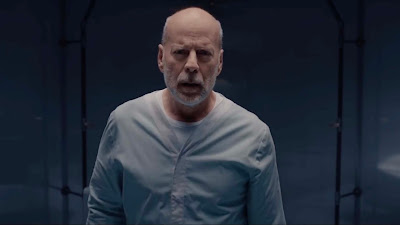That "Unbreakable" and "Split" should blend isn't a stretch. Their link has long been on the wall of writer/director M. Night Shyamalan's cinematic universe, and in this time of live-action, DC/Marvel crossovers, why not a dexterous, subdued variation: a superhero fable filtered through the character-driven irony of "The Twilight Zone"?
With "Glass", named after Samuel L. Jackson's "Unbreakable" trickster, otherwise known as bone-fragile Elijah Price, our crafty filmmaker presents not only the flamboyant, titular terrorist, but Willis' sometimes hooded, though always valiant David Dunn. There's also James McAvoy's dangerous and anguished Kevin Wendell Crumb, abetted by a Horde of ready-to-rise personalities. These characters ultimately connect at Raven Hill Memorial Hospital, probed for a "cure" of their "alleged" abilities, but no matter what motions their psychologist, Ellie Staple (Sarah "American Horror Story" Paulson) takes, the three are destined to keep different yet overlapping goals.
As a result of their fated teaming, the conniving Mister Glass provokes Wendell's inner Beast, realizing that once this impetuous personality has been sprung, a major revelation will come to the world. As part of this unraveling plot, Dunn must squash Wendell's monstrous portion, but it won't be easy with Shyamalan's ingenious, signature foils.
It's not just the writer/director's well crafted concept that makes the movie's heart pound, but its consummate leads: each established in previous chapters, but now like fine wine, richer...more matured. Their interactions resonate with urgency and sincerity, even when projected beyond their scope. In fact, the results of their clashing efforts fall right into the lap of "Split'"s Anya Taylor-Joy's Casey Cooke (Anya Taylor-Joy); Dunn's son, Joseph (Spencer Treat Clark) and Price's mom (Charlayne Woodard): for all intents and purposes, sidekicks to accompany the principals' weird, epic journey.
Like other Shyamalan productions, this one chases the truth, which makes it a morality tale, but then aren't all superhero stories? Shyamalan knows the good-vs-evil deal better than most: how the tipping of the scales can impact lives, whether on a glossy, Hollywood stage or in everyday life. "Glass" emanates from the former, but prospers in the latter, reminding us that the causes of right and wrong, of courage and fear, dwell within the most common crevasses: "Twilight Zone"-ish, indeed.
To further its intent, "Glass" demonstrates that despite what the story's secret-society scholars proclaim, heroes can rise from out any villainous pit: that no matter how horrid the actions, there's always a helping hand (whether plebeian or preternatural) to right the wrong and reassemble the shards. We only need open our eyes to see the evidence, to accept the truth, which is as clear as glass when we at last focus. In other words, "Glass" helps us see the world through a clear, logical lens, even if that lens hangs upside down.
"Glass" will be recalled by most for its clever, identifiable delivery. Granted, we've swallowed the movie's concept many times over, but it's been rarely served with as much labyrinthine sophistication or seasoned uber-humanity.








I'm damn curious as to what Bill Maher thinks of "Glass", considering his misinformed, follow-up comments on Stan Lee. Then again, Maher wouldn't watch a movie like "Glass", only condemn it sight unseen. All the same, the film (more so than most others) acts in direction opposition to his hateful stance on comic-book movies. I'm certain that I'm not the only one who's picked up on this.
ReplyDelete